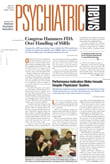A majority of Americans believe that the health care needs of children and the elderly are not being met, according to a survey published in the online edition of the journal Health Affairs last month.
The survey also found that many Americans assume an equal distribution of health care resources among children and the elderly, when in fact there is a significant per capita and aggregate difference favoring the elderly.
There is widespread support for a strong government role in providing health care to all children and the elderly, regardless of income level, and this support cut across age groups, gender, and political party affiliation, the results of the survey indicated.
According to the survey, 59 percent of adults believe that the health care needs of children are not being met, while 67 percent believe that the health care needs of the elderly are not being met. When questioned about the role government should play in financing health care for these groups, 90 percent thought that government should fund health care for all low-income children and elderly, while almost the same percentage felt that this funding should be available to both age groups, regardless of income.
“People want to take care of the poor and people who have needs,” said lead study author Marc Berk, vice president and senior fellow at the National Opinion Research Center (NORC) at the University of Chicago, which conducted the survey. “In an era of likely budget deficits where there is a lot of pressure to look for ways to cut programs, this survey shows that health care is not an area that the public wants to consider cutting.”
The survey was funded by the Nemours Foundation and was conducted by telephone from June 4 to 18. Using random-digit dialing, 2,013 respondents from a nationwide sample were interviewed. They were asked a series of questions concerning their views on public funding of health care programs for children and for the elderly.
In addition to the survey results, the September Health Affairs offers new data on generational differences in government spending, how children are affected by downturns in the economy, and an analysis of the challenges facing the State Children's Health Insurance Program (SCHIP).
At least two-thirds of those surveyed indicated that they believed that children and the elderly were already receiving the same level of health care resources. In fact, however, current per capita public spending on health care for the elderly is far higher than that for children. In 2001, for example, per capita government spending on health care for the elderly was $4,360, compared with $258 for children, the authors of the survey article noted.
In an interview with Psychiatric News, Berk explained that the survey question did not specify whether people assumed equal resource allocation in per capita or aggregate terms. Rather, he said, the question was a measure of how people viewed societal priorities; that is, the responses were an indication of a general assumption that the government would not favor one group over the other, he said.
“Although governmental spending on the elderly vastly exceeds that for children, most Americans, including those with a college education, do not [believe] this to be the case,” Berk and colleagues stated in their report. “When asked about the relative priority that government should place on the health care needs of children versus those of the elderly, Americans clearly do not want government to choose, with a majority indicating that government should be spending about the same on children as it does on the elderly. In light of the apparent lack of understanding about current spending, the public sentiment that supports equal funding for health care for children and the elderly should probably be interpreted not as a call for an enormous shift of resources from one group to the other but as evidence that the public considers these needs to be of equal and high priority.”
A study by researchers at the University of Pennsylvania School of Medicine, also published in the same issue of
Health Affairs, shows that the gap in per capita social welfare spending between children and the elderly grew 20 percent in the past two decades. The study indicates that unlike spending on the elderly, spending for children suffers during economic recessions, as evidenced by recent cutbacks in many SCHIP programs stemming from overall state budget cutbacks (see
page 6).
The survey report, “Americans' Views About the Adequacy of Health Care for Children and the Elderly,” is posted online at<content.healthaffairs.org/cgi/content/abstract/hlthaff.w4.446>.▪
